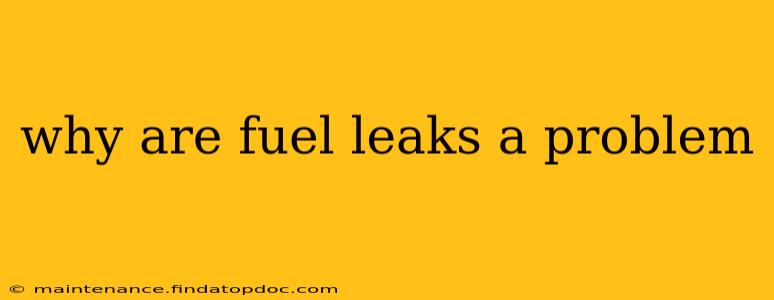Fuel leaks are a serious problem for several reasons, ranging from environmental damage to immediate safety hazards. Understanding the dangers associated with fuel leaks is crucial for vehicle owners, mechanics, and anyone working with fuel systems. This comprehensive guide delves into the various aspects of why fuel leaks are such a significant concern.
What are the dangers of a fuel leak?
The dangers of a fuel leak are multifaceted and depend on several factors, including the type of fuel, the amount leaked, and the environment. However, some key dangers consistently emerge:
-
Fire Hazard: Fuel is highly flammable. Even a small leak can create a significant fire risk, especially near ignition sources like sparks from electrical components or hot engine parts. A larger leak dramatically increases this risk, potentially leading to a devastating fire.
-
Explosion Hazard: In enclosed spaces, fuel vapors can mix with air to create an explosive mixture. A spark or other ignition source could then trigger a dangerous explosion. This risk is amplified with gasoline, which evaporates more readily than diesel fuel.
-
Toxic Exposure: Fuel, particularly gasoline, contains toxic components that can cause health problems through inhalation or skin contact. Long-term exposure to fuel fumes can lead to various respiratory issues, while skin contact can cause irritation and even chemical burns.
-
Environmental Damage: Fuel spills contaminate soil and water sources, harming wildlife and ecosystems. Gasoline, in particular, is highly toxic to aquatic life and can leach into groundwater, contaminating drinking water supplies. Regulations are in place to minimize such damage, but leaks still pose a significant environmental threat.
What causes fuel leaks?
Understanding the causes of fuel leaks is critical for prevention. Common causes include:
-
Damaged Fuel Lines: Age, corrosion, rodent damage, or physical impacts can weaken and crack fuel lines, leading to leaks.
-
Faulty Fuel Pump: A malfunctioning fuel pump can create pressure imbalances, forcing fuel out of weakened seals or connections.
-
Loose or Damaged Fuel Connectors: Improperly tightened or damaged connectors and fittings can create pathways for fuel to escape.
-
Cracked Fuel Tank: Rust, corrosion, or impact damage can fracture the fuel tank, resulting in potentially significant leaks.
-
Failing Fuel Injectors: While less common, worn or damaged fuel injectors can leak fuel into the engine compartment.
-
Improper Maintenance: Neglecting routine maintenance, like checking fuel lines and connections, significantly increases the risk of leaks.
How can fuel leaks be prevented?
Prevention is always the best approach. Regular vehicle maintenance is key, including:
-
Regular Inspections: Visually inspecting fuel lines and connections for damage or leaks during routine maintenance checks.
-
Prompt Repairs: Addressing any signs of damage or leaks immediately to prevent escalation.
-
Professional Servicing: Regular professional servicing ensures that potential problems are identified and addressed before they become serious safety hazards.
What should you do if you suspect a fuel leak?
If you suspect a fuel leak, do not attempt to repair it yourself. Fuel is dangerous and requires specialized knowledge and safety precautions. Instead:
- Turn off the ignition immediately.
- Ventilate the area.
- Keep away from any potential ignition sources.
- Contact a qualified mechanic or emergency services.
What are the signs of a fuel leak?
Identifying a fuel leak early is crucial. Key signs include:
- Fuel odor: A strong smell of gasoline or diesel fuel.
- Fuel stains: Wet spots or stains under the vehicle.
- Fuel puddles: Accumulation of fuel on the ground.
- Rough engine running: In some cases, a fuel leak can affect engine performance.
- Reduced fuel economy: Unexpectedly low fuel efficiency could signal a leak.
In conclusion, fuel leaks are a serious hazard posing significant fire, explosion, health, and environmental risks. Prevention through regular maintenance and prompt attention to any suspected leaks is crucial for ensuring safety and minimizing potential damage. Never hesitate to seek professional help if you suspect a fuel leak.
